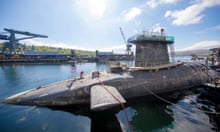Tomorrow’s Trident vote is taking place even though parliament has already made the funds available to renew our nuclear deterrent. So this is little more than partisan political game-playing from the Tories.
I make no bones about my belief that we need to replace Trident. But I am not wedded ideologically to Trident, come what may. I hope one day we will have no need of a nuclear deterrent and I believe we must plan for a future without one. Warfare is changing. In the US, the military is pursuing a “third offset” strategy designed to anticipate and respond to new threats.
Some of the military challenges we will face in the future, including those posed by Russia and China, will feel familiar. Others won’t. As chair of the all-party group on drones, I saw how quickly defence technology is evolving and how rapidly military robotics is advancing.
Those who criticised Emily Thornberry when, in her former role as defence spokesperson, she said unmanned vehicles might one day render an underwater deterrent obsolete, were too quick to do so. We must be mindful of the impact new technology could have on the effectiveness of our deterrent. But now is not the time to step away from our historic role as a nuclear power. When Attlee built Britain’s bomb, he did so because he knew our role in the world would be shaped by our capacity to defend ourselves and our allies; the logic of that Labour party position holds even truer today.
This summer has been significant and confusing for the UK. It has felt like the finale to a big-budget American melodrama, packed with plot twists and the occasional dose of paranoia. We have been forced to confront questions about our identity and role in the world. For many, this has been painful.
The referendum result renders many of the assumptions that underpinned British defence and foreign policy void. We can no longer depend on the EU to amplify our voice. We can no longer expect our goodwill and good neighbourliness to be taken for granted. Britain must find a way to live up to the promise, made by so many who campaigned for Leave, that while we may be leaving the EU we have not abandoned Europe. To our friends in Europe, we have the opportunity to demonstrate that our historic bonds of mutual respect and mutual aid will survive Brexit. I am pleased that the UK is committed to deploying our troops as part of Nato’s Baltic forces. Putin’s Russia looms, a mafia state built on chauvinism. Britain must play its part in holding it at bay.
To abandon our deterrent in that context would be a grotesque abandonment of our friends at a time of great peril. Trident is not merely an instrument of our sovereign national interests – it is the protective curtain behind which freedom and democracy have flourished in countries across eastern Europe.
And what would we say to our constituents in this country who would be hurt by a decision not to replace? The construction and maintenance of Trident’s replacement will directly support more than 30,000 jobs in the UK, including 6,000 at BAE Systems’ facility in Barrow-in-Furness. Unite, my union, has said a failure to renew would lead to the “obliteration” of thousands of its members’ jobs and warned many communities would become “ghost towns”. That is an economic catastrophe we cannot afford and one we cannot ask those communities to pay.
Labour’s policy on Trident is clear, but our MPs have been offered a free vote because there is a difference of opinion in the shadow cabinet. I support that. But those MPs who vote against Trident should be in no doubt that they are voting to put tens of thousands of defence engineers out of work, many of them members of Unite and the GMB. If you are a union general secretary supporting a unilateralist politician, you do so in the knowledge that thousands of your members may lose their jobs.
Some argue that Labour should abstain tomorrow, citing the current Labour defence review as justification. Yet to do so is an abdication of responsibility. No matter what low cunning has engineered this vote, MPs have a duty to take a position. We cannot say to the country that we haven’t made up our minds on strategic defence.
On security, on jobs and on Britain’s role in the world the evidence is stacked in Trident’s favour. When that evidence shifts, so will my position. Until it does, to oppose Trident’s replacement is to be in favour of inflicting real harm on this country’s defences and the livelihoods of thousands of skilled British workers.
Tom Watson is deputy leader of the Labour party














Comments (…)
Sign in or create your Guardian account to join the discussion